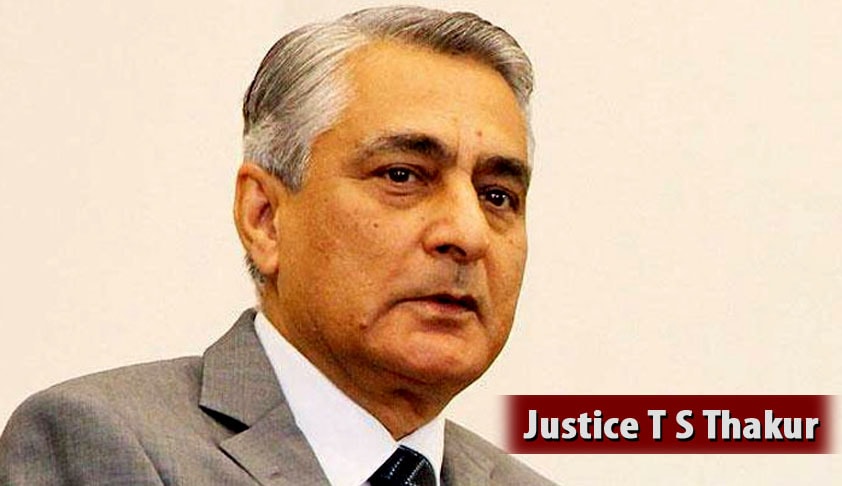Listen to the Chief Justice of India
Abhik Chimni
23 Aug 2016 10:26 AM IST

Chief Justice T.S. Thakur is soft spoken and composed -- a Judge who in proceedings in his court often disarms arguing counsels with humour. However, on Friday, August 12 the Chief Justice’s usual poise was shaken. The highest judicial authority of the land, incensed by the indifference of the Central Government to the urgent requirement of appointing judges warned the Attorney General (AG) that the Supreme Court of India would contemplate judicial intervention if the Centre continues to delay clearing names recommended by the collegium.
This unusual cautioning is a result of deep exasperation. One may go back to April 24, 2016 where the CJI in the annual conference of chief justices and chief ministers attended by Prime Minister Narendra Modi , made an emotional plea to the Executive to urgently help change the abysmal judge to population ratio. However it seems this government has different priorities.
One of the first decisions of the BJP led government was to build a consensus on passing a Constitutional Amendment for creating the National Judicial Appointments Commission (NJAC). This amendment would allow the political class to finally have a say in the appointment of judges eroding the independence of the judiciary. However to the dismay of the center, the Honorable Supreme Court struck down the amendment as being unconstitutional.
The reaction of the Centre to the decision of the Apex Court displayed gross disregard to institutional dignity. The government went to the extent of calling the judgment “the tyranny of the unelected” words that demean the relationship between the executive and the judiciary, so central in the imaginary of the Indian Constitution. The Centre still smarting with the judgment it seems, is now trying to do indirectly what could not be managed directly through the NJAC.
This is being done through the Memorandum of Procedures (MOP) for the appointment of High Court Judges issued by the Ministry of Law and Justice. After the Constitution bench had struck down the NJAC; The Centre submitted to the Supreme Court that they it was greatly concerned about transparency in the judiciary. Subsequently the bench had asked the central government in December 2015 to prepare a fresh MOP to make sure that the independence of the judiciary is not compromised.
The MOP is yet to be finalized. The Supreme Court collegium and the Central government are yet to reach a consensus on certain important issues. Meanwhile the court decided that vacancies couldn’t be stalled till the MOP is decided. The collegium therefore continues to make recommendations to the center for appointment of judges.
The main contending issues between the Centre and Judiciary seem to suggest that the executive is still trying to find a way of influencing appointments to the Judiciary. The first issue being that of “criteria” of appointing judges where the Government has taken the position that seniority ought to be the binding criteria.
The problem with this is that though the collegium does give considerable weightage to seniority, it cannot be the sole criterion for that limits their ability to make a decision keeping in mind considerations of “merit” and “integrity”. This would dilute the power of the collegium to appoint judges as laid down by the Supreme Court in the S.P. Gupta case and the recent judgment striking down the NJAC.
The second issue is that the Centre wants the formation of a secretariat that would take over key tasks from the keeping all relevant databases of judges to deciding collegium meetings. And this secretariat would be under the Ministry of Law and Justice! Third, the Government also much like the NJAC wants to involve more members into the process of selecting judges by involving those who are not sitting judges.
In this context take into consideration the fact that on February of 2016, 75 names were recommended by the collegium to be appointed in various High Courts across India and the Centre is yet to act on even of the recommendations! The Centre has not even bothered to send back names they want reconsidered; they have willfully decided to look away from the situation.
Why the NJAC was rightfully struck down as unconstitutional and hindered the independence of the judiciary has been explained in an earlier article. Now what we are seeing is a situation, which is against the constitutional principle of separation of powers.
The Centre it seems, wants to reimagine the role of the judiciary in India. There is a concerted attempt at trying to undermine the Courts this can be seen from the act of trying to control appointments to questioning the legitimacy of judicial power exercised by courts in public interest cases (the Drought case where Ministers in blatant disregard to constitutional law warned the judiciary not to cross the lakshman rekha).
The Constituent Assembly did not imagine the constitutional courts as mere dispute resolution bodies. Through the constitutional power of judicial review they remain the foremost protector of our fundamental rights and this repeated attempt at interfering in the role of the courts in the name of transparency is against the essence of Indian democracy.
Currently we are in a situation where the “right to appeal” to the high court itself is becoming a struggle for citizens. This Government has seen vacancies going up from 30% in May 2014 to 44% in 2016. Litigants in this country are struggling to find relief in cases ranging from pension payments to the illegal acquisition of land to the unlawful arrests and prosecutions where innocent people remain in jail because of a lack of access to courts. Yet currently 200 names forwarded by the Collegium for appointment to the High Court remain stuck with the executive.
The Judiciary cannot keep being blamed for the state of our justice system. The 2014-15 budget saw a mere 0.11% dedicated to the courts which shows the priority the political class gives the judiciary. Increased litigation is a sign of peoples awareness of rights and also that they believe the courts can provide relief. Vacancies therefore must quickly be dealt with so people can have their rights protected by the Judiciary.
The AG will return next month to inform the Court on the recommendations made by the collegium and hopefully an amicable path will be found. It would be a sad day for our democracy if the CJI were forced to pass judicial orders to coerce the Centre to react to a situation where people across India are being denied access to justice merely because of the delay in the appointments of Judges.
 Abhik Chimni is a Lawyer practising in the Supreme Court of India.
Abhik Chimni is a Lawyer practising in the Supreme Court of India.
This Article is first published Here. We are re-publishing it on Author's request.


